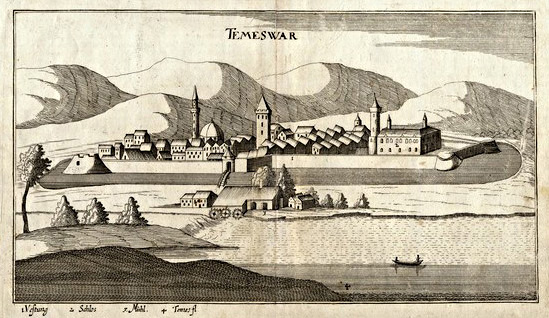-
800 years of documentary testimony of Timisoara
Romania 2012.03.26
In issue: Stamp(s): 4
Printing: offset
Issued in: sheets of 8 stamps and 1 label (3*3)
-
Number by catalogue: Yvert: 5592
Perforation type: 13 ¼x13 ¼
Subject:
5 lei. Timisoara* Fortress in 1602, a reproduction after a chromolithography made by Fork E. in 1876 at Timisoara.
-
Number by catalogue: Yvert: 5593
Perforation type: 13 ¼x13 ¼
Subject:
7.6 lei. Castle Corwin (Hunyadi)**
On the coupon sheets of this and previous stamp, is represented copper-plate engraving of the city of Timisoara, printed by Wagner in his Delineatio Provinciae Pannoniae, in Augsburg in 1685 (see the illustration below)
Additional:
*Timișoara (Romanian pronunciation: [timiˈʃo̯ara]; German: Temeswar, also formerly Temeschburg or Temeschwar, Hungarian: Temesvár, Hungarian pronunciation: ['tɛmɛʃvaːr]) is the capital city of Timiș County, in western Romania. One of the largest Romanian cities, with a population of 303,708 inhabitants (the third most populous city in the country, as of 2011), and considered the informal capital city of the historical region of Banat, Timișoara is the main social, economic and cultural center in the western part of Romania.
Timișoara was first mentioned as a place in either 1212 or 1266. The territory later to be known as Banat was conquered and annexed by the Kingdom of Hungary in 1030. Timișoara grew considerably during the reign of Charles I, who, upon his visit here in 1307, ordered the construction of a royal palace. Timișoara's importance also grew thanks to its strategic location, which facilitated control over the Banat plain. John Hunyadi established a permanent military encampment here, and moved here together with his family. In 1552, Ahmed Pasha conquered the city with a 16,000 Ottomans and transformed it into a capital city in the region. The local military commander, Stefan Losonczy, was captured and beheaded on July 27, 1552 after resisting the Ottoman invasion with just over 2,300 men.
**

_________
This information has been taken from Wikipedia
________
Please, also look at FDC for this issue



2012-2s-logo.jpg)
2012-1s-frgm.jpg)
2012-1s-logo.jpg)